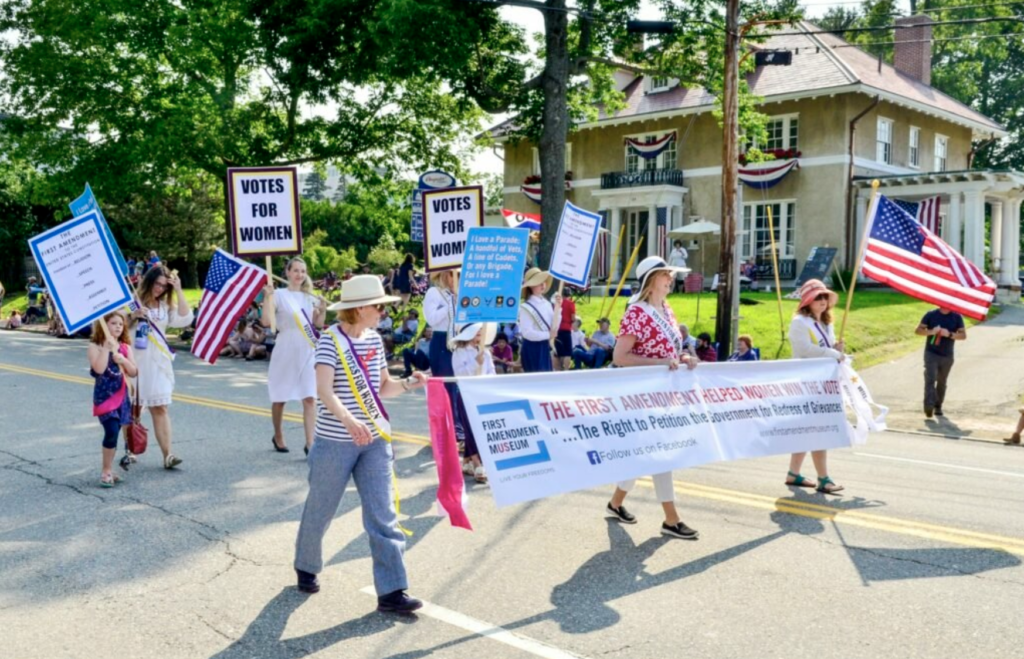The Augusta museum’s annual event culminated with a Suffrage March, celebrating the centennial of the 19th Amendment.

Visitors to the First Amendment Museum on Thursday got more than a good seat for the Fourth of July parade in Augusta, they got a sneak peek into the not-yet-open museum.
The First Amendment Museum, which is going through a “soft opening” before crucial construction projects begin, held their second annual Family Fun Day at the Gannett House at 184 State St. The museum, true to its name, has been described as a “concept museum” about the First Amendment and the freedoms it protects, freedoms of religion, speech and the press and the rights of people to peaceably assemble and petition their government.
The celebration also included light refreshments and outdoor games, as well as tours of the museum. The museum’s front lawn was decorated with American flag-colored lawn chairs while children did arts and crafts and adorned themselves with U.S.-themed temporary tattoos. A number of visitors set up their chairs for the parade before taking a walk through the museum.
After the tours and open house, a handful of attendees and museum officials joined Augusta’s parade holding signs and wearing sashes encouraging women to vote to re-enact a suffrage march.
Co-founder Terry Gannett Hopkins said the women’s suffrage movement is tied to the first amendment because women petitioned their government. She said the women’s suffrage movement began in the 1840s. The suffrage movement resulted in the 19th Amendment, which was passed in 1919, but not ratified by every state until 1920. It prohibits state and federal governments from denying the right to vote to citizens of the U.S. on the basis of sex. Maine was the 19th state to ratify the amendment on Nov. 5, 1919.
Museum Director and co-founder Genie Gannett said the event’s turnout was better than last year’s but a few people pulled out of the march due to weather, which hovered around 90 degrees for most of the day.
Exhibits in the museum may seem like the home’s natural decor, but have powerful symbolism. During a tour, Gannett motioned to a dining room table and explained that the table is where people most often practice their First Amendment rights. She also hearkened back to suffragettes who didn’t think it was “lady-like” to hold signs, so they would hold tea parties to bolster the movement.
Other exhibits explained in simple terms how countries with stricter limitations on speech go about spreading information. Genie Gannett opened up a drawer that appeared to be full of rice, but it also contained flash drives. She said shopkeepers in North Korea would keep stored information inside of rice and provide it to customers after they use a code word. A large Jenga game with a number of precarious blocks is used in a kid’s room to illustrate the risk of speaking out in a country with strict speech laws.
Gannett said the exhibits, which use relatable themes from everyday life, are designed to be “sticky,” or easily retained by visitors. She said, citing a Newseum poll, that 40% of Americans could not name a single freedom guaranteed by the First Amendment, so the museum exists for people to live and practice their freedoms.
“It’s about how you feel and we know that learning (should be) sticky,” she said. “If you want to remember and know, making and doing … solidifies that.”
Gannett said that some future exhibits could target school-aged children and attempt to clarify the differences between their normal freedoms and their freedoms in a school setting. She said the museum is “fiercely non-partisan.”
Steve Cushman, who attended the event with his five children, said his children enjoyed the hands-on exhibits explaining the freedoms and seeing the suffragette costumes. He said it was “absolutely” important to teach children about their First Amendment freedoms, but admitted the learning for more for them and he was more interested in the historical architecture inside the Gannett House, which was built in 1911.
Organizers said they will hold a suffrage march re-enactment in 2020 to commemorate the full ratification of the amendment.
This article was originally published in the Kennebec Journal by Sam Shepard.

